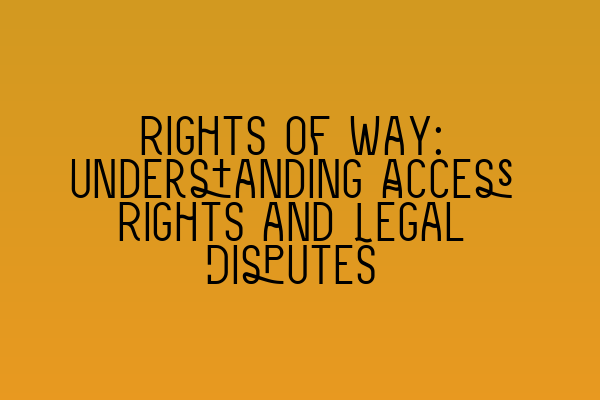Rights of Way: Understanding Access Rights and Legal Disputes
At SQE Property Law & Land Law, we understand the complexities of property rights and the importance of clear access for landowners and property occupants. One area where disputes can arise is in regards to rights of way. In this blog post, we will explore what rights of way are, the different types of access rights, and how legal disputes can be resolved.
What are Rights of Way?
A right of way is a legal right that allows a person to pass through or use someone else’s property. This right can be granted explicitly through a legal agreement or may be implied by regular use over time. The purpose of a right of way is to provide a legal pathway for individuals to access land, whether it be for residential, commercial, or agricultural purposes.
Types of Rights of Way
There are different types of rights of way, each with its own implications and legal requirements. Understanding these types is essential for both landowners and those seeking access to property.
1. Public Rights of Way: Public rights of way are legally recognized access routes that are available for use by the general public. These are typically footpaths, bridleways, or byways, and are often designated on Ordnance Survey maps. Landowners cannot obstruct or inhibit public rights of way unless specific circumstances permit it.
2. Private Rights of Way: Private rights of way, on the other hand, are access rights granted to specific individuals or groups. These rights can be established through a written agreement, such as a deed or contract, or may be inferred from historic use of the land. Private rights of way do not automatically grant access to the general public.
Legal Disputes and Resolution
Unfortunately, disputes surrounding rights of way can arise, leading to conflicts and potential legal action. Common issues that may give rise to disputes include:
1. Obstruction of the Right of Way: If a landowner obstructs a right of way, it can become a point of contention. Whether intentional or unintentional, obstructing a right of way can lead to legal action to enforce access.
2. Disputed Access Rights: Sometimes, there may be a disagreement about the existence or extent of a right of way. This can occur when there is no formal documentation granting access, and the parties involved have differing interpretations.
3. Change in Use: The purpose for which a right of way was initially established may change over time. This can create conflicts as the landowner or occupant may object to the new use of the access route.
4. Maintenance Responsibilities: It is important to establish who is responsible for maintaining a right of way. Disputes can arise when one party believes the other is neglecting their duties, leading to the deterioration or obstruction of the access route.
In the event of a rights of way dispute, it is advisable to seek legal advice from a property law solicitor. They can help you understand your rights, assess the situation, and provide guidance on the most appropriate course of action.
Considering Misrepresentation in Contract Law and Rights of Way Disputes
Misrepresentation in contract law is another area that can intersect with rights of way disputes. If a party intentionally or unintentionally misrepresents certain facts regarding a right of way during negotiations or agreements, it can lead to legal consequences. It is crucial for both parties involved in a property transaction to provide accurate and truthful information to avoid potential disputes related to access rights. To learn more about misrepresentation in contracts, you can read our article Misrepresentation in Contracts: Unveiling Deceptive Practices.
SQE Contract Law Syllabus and Land Law Cases
Understanding the legal framework surrounding rights of way and access rights is vital for solicitors specializing in contract law. The SQE Contract Law syllabus covers various topics related to property law, including rights of way and land law cases. To gain a deeper insight into the syllabus and its content, you can refer to our article A Closer Look at SQE Contract Law Syllabus.
Analyzing Landmark Cases and Influential Judicial Decisions
Landmark cases and influential judicial decisions play a significant role in shaping property law and rights of way. Studying these cases can help solicitors gain a comprehensive understanding of the legal principles and precedents that guide rights of way disputes. To explore some notable cases and decisions, you can read our article SQE Contract Law: Analyzing Landmark Cases and Influential Judicial Decisions.
Contractual Capacity Limits and Rights
When entering into agreements related to property rights, understanding contractual capacity is crucial. Contractual capacity refers to a person’s legal ability to enter into a contract and be bound by its terms. To explore the rights and limitations associated with contractual capacity, you can refer to our article Understanding Contractual Capacity: Rights and Limitations.
Interactive SQE Mock Tests for Contract Law
If you want to test your knowledge and understanding of contract law, including property law and rights of way, we offer interactive SQE mock tests. These tests provide an opportunity to assess your preparedness for the SQE exams and ensure you have a strong foundation in the necessary legal principles. To take the interactive mock tests, visit our article Interactive SQE Mock Tests for Contract Law: Test Your Knowledge.
Conclusion
Understanding rights of way and the legal implications surrounding access rights is essential for both landowners and individuals seeking access to property. When disputes arise, seeking legal advice from a property law solicitor is advisable to ensure your rights are protected. At SQE Property Law & Land Law, we are here to provide expert advice and guidance for all your property law needs. Reach out to us today to discuss your rights of way concerns and any other property-related matters you may have.
